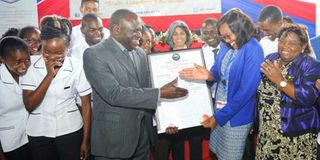SPONSORED CONTENT: Council accredits MKU to offer undergraduate training for nurses

What you need to know:
- NCK first approved MKU’s nursing degree programme in 2011.
- MKU School of Nursing started offering the Bachelor of Science in Nursing (BScN) programme in January 2012.
- Since its inception, the school has continued to grow in terms of student numbers.
Mount Kenya University (MKU) is among the first five universities in the country to once again earn accreditation to train nurses at undergraduate level.
On March 23, the Nursing Council of Kenya (NCK) Registrar and Chief Executive Officer Edna Tallam-Kimaiyo gave MKU Vice-Chancellor Prof Stanley W. Waudo the accreditation certificate at the university’s main campus in Thika.
The NCK CEO said: “Accreditation is the process of officially recognising an institution as having a particular status, and is deemed qualified to train. In accrediting nurse-training institutions in Kenya, NCK is ensuring that the calibre of nurses educated in these institutions is competent. Mount Kenya University has this status. NCK acknowledges this achievement.”
NCK first approved MKU’s nursing programme in 2011.
TRAIN NEXT GENERATION
While presenting the accreditation certificate, the NCK CEO said she looked forward to seeing MKU train “the next generation of young, bright and vibrant nurses of our great country.”
The MKU School of Nursing started offering the Bachelor of Science in Nursing (BScN) programme in January 2012, following NCK’s approval.
The school, Ms Tallam-Kimaiyo told those present, had once again proved to the council and other stakeholders that it had met quality standards.
Dr Jane Karonjo, Dean, MKU’s School of Nursing, thanked the university’s Board of Directors “whose tremendous support made the accreditation possible”.
She said: “The school qualified for NCK accreditation following a thorough inspection, where it scored 100 per cent on critical requirements and 97 per cent for non-critical requirements.”
THREE MODULES
MKU offers the BScN programme in three modules: Regular, part-time and distance learning.
The university’s Master of Science in Nursing (MScN) degree is available in the following options: Midwifery, Critical Care, Nursing Education, Nursing Leadership and Medical-Surgical Nursing.
Since its inception, the school has continued to grow in terms of student numbers, physical facilities and number of nursing faculty.
The current student population is 495. Those studying for the BScN are 465, while the MScN programme has 30.
The accreditation process followed a circular sent to all nurse training institutions and programmes by NCK on the need for fresh accreditation.
Dr Karonjo assured the NCK registrar that the school “shall continue to strive towards unlocking infinite possibilities in nursing education”.
CRITICAL ROLE
Ms Tallam-Kimaiyo reminded those present during the handing over ceremony that nurses played a critical role in a country’s populations’ health and health care systems. Furthermore, they are key to achieving universal health care.
She reminded the future nurses of “the special responsibility” bestowed upon them even in the constitution.
“You must know your boundaries and above all, have the characteristics of a nurse. Do your documentation right, at the right time and on the right patient,” she said.
She further urged all nurses “to respect patients, maintain patients’ dignity and protect patients’ rights”, adding: “Nurses must create an environment of mutual trust and respect with patients and healthcare professionals.”
The NCK registrar said the council looks “forward to a continued collaboration with Mount Kenya University in strengthening nursing profession and nurses in ‘Unlocking Infinite Possibilities’.”


